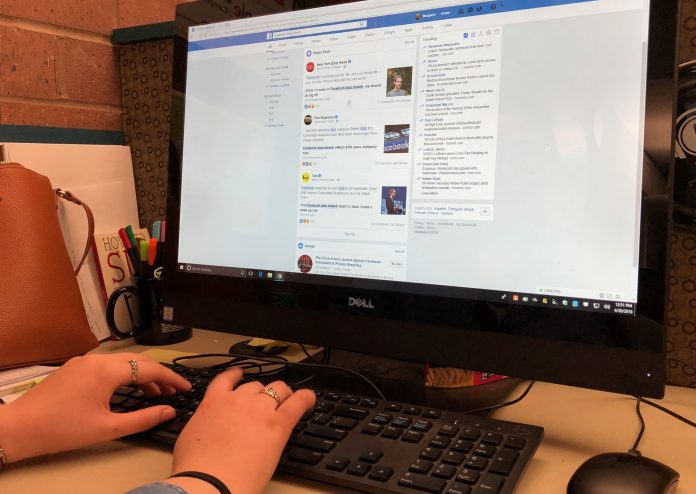
Kim Harms
News editor
Facebook recently experienced a data breach releasing information from 87 million users to Cambridge Analytica. The data breach left users wondering how their information was released and whether or not they should continue to use Facebook.
Aaron Simpson, student technician, Technical Support Center, said data breaches and hacks happen one of two ways: An individual can gain access to a server and acquire personal information or companies could have a very weak level of security making their users susceptible to data breaches.
“People commonly think of hacking as accessing somebody’s password and then hacking into somebody’s account,” Simpson said. “Most hacking these days comes in the form of social engineering. In the form of finding out somebody’s username or [security questions]. If people [access] that, it can be pretty dangerous.”
The data breach was traced to the app “This Is Your Digital Life.” The app required users to log into their Facebook account to grant third party access to their public profile information. These apps can be susceptible to data breaches partially due to curiosity leading people to look past what information the app is asking for.
“You see those apps that say, ‘What superhero are you?’ or ‘What’s your astrological sign?’ I think it’s through apps like that,” Simpson said. “People have a habit [looking at] horoscopes and they want to click on things like that and share them with their friends. What they don’t realize in doing that is they’re giving away a certain piece of themselves.”
Hacking is another way personal information can easily be released. Mariam Habib, student technician, Technical Support Center, said hacking is very common. Habib’s own Facebook account was targeted by a hacker before.
“Hacking, I would say, is pretty easy because, personally, it’s happened to me,” Habib said. “I don’t set my passwords to something very easy, so [I thought] it was really weird when it happened to me. I have the same password for Facebook and Instagram which I know I shouldn’t do, but I did. The [hacker] took pictures from my Instagram and they put them on my Facebook.”
Habib reported her hacked account to Facebook so it could be recovered. Habib said she thinks thinks many social media platforms efficiently take care of situations involving hacked accounts.
“I had to report them,” Habib said. “Facebook was really good about having that other person get off my account and making me change my password so it didn’t happen again. It definitely happens quite often. I feel like social media is very good with [cooperating] and fixing the issue.”
Angel Capetillo, student, said he will continue to use Facebook despite the data breach. However, Capetillo is weary of using apps that require a Facebook login because of how the data breach occurred.
“I don’t get on [my account] a lot like other people who spend most of their time on there,” Capetillo said. “I don’t really trust Facebook. I’ll just look at what’s going on, but it’s not like I trust it 100 percent. I don’t think I’ll use them because of what happened. They take some of your personal information sometimes.”
Many social media platforms have security settings, Facebook being one of them. Capetillo said he doesn’t plan on making plan on making major changes to his account’s security because he does not put personal information on his profile.
“All I think I have is my birthday and my name on [my profile],” Capetillo said. “Besides that, I don’t put a bunch of personal stuff on there of importance. It’s Facebook, everyone can see it and it’s worldwide. If you’re gonna put something on there most of the world is going to see it.”
Habib said there are several steps Facebook users can take to help protect their accounts from hacking. Keeping different passwords for each social media account is one way users can protect their profile.
“I would not put your exact location,” Habib said. “If you do, I would make your account private regardless. In your pictures I wouldn’t include anything like car plates for people to easily track you. Definitely have different passwords for all your social media. Make sure they’re not easily guessed. Don’t accept friend requests from strangers. You have to be really careful with who you add.”
In addition to being cautious of friend requests from strangers, Simpson said users should be careful of apps linked with Facebook. Simpson said users should pay close attention to how much access the app is asking for.
“Watch for what they’re asking for,” Simpson said. “These third party apps will ask, ‘Can we access this, this and this?’ In general that is one of my big signs when I click on those things. Generally, I actually think about it. Am I okay with them seeing my photos? Am I okay with them seeing my friends? Being cautious of things like that can be a big help.”
To learn more information about the data breach visit Facebook’s help center website.





















